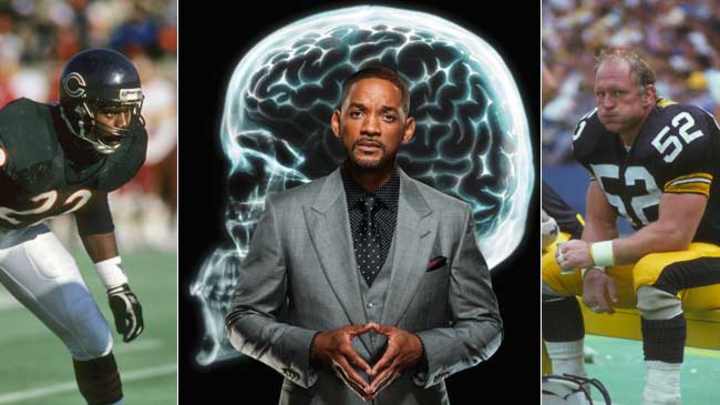‘Concussion’: The Review

Concussion is a football movie that goes against the grain of its genre. Midway through the film, Dr. Bennet Omalu (Will Smith) explains the degenerative brain disease chronic traumatic encephalopathy to researchers at Carnegie Mellon by showing a picture of a woodpecker, whose brain remains unscathed despite ramming its head against a tree some 12,000 times a day. The bird’s tongue, Omalu tells them, wraps from the back of its mouth, around the skull and through the nostril to protect its brain. When people hit their heads playing football, he says, their brains have no shock-absorbing safety belt.
To emphasize his point, Omalu shakes an egg inside a glass jar, mimicking how the brain moves around inside the skull. He also scribbles on a white board, diagramming S’s (Steelers) and O’s (other team) to demonstrate how linemen clash helmets with alarming volume.
“As a football fan, I do not like it,” one of the researchers says of Omalu’s findings. “But as a scientist, I can’t ignore it.”
• THE CONCUSSION PROBLEM: Here is the NFL’s reaction to new movie
The goal of this movie is a blunt as its title: to make football fans finally pay attention to science. There is no new information in Concussion, which dramatizes the story of the Nigerian-born pathologist who discovers CTE while performing the autopsy on Hall of Famer Mike Webster in Pittsburgh. The unraveling post-career life of the longtime Steelers center, who suffered from depression and dementia (at times he lived out of his pickup truck) and died at the age 50, was chronicled in Jeanne Marie Laskas’s 2009 GQ article “Brain Game” and in the 2013 PBS documentary League of Denial. In the movie, Webster’s undoing is portrayed in harrowing fashion by David Morse, the ubiquitous character actor whose formidable performance is worthy of an Oscar nomination.
Concussion bills itself as “the movie the NFL doesn’t want you to see”—and given that universal traction is often spurred by visual evidence, it’s not an outrageous claim. Remember, it was the video of Ray Rice punching his soon-to-be wife that forced the league to change. So many indignities follow a similar pattern in professional football. Unless they’re thrust into the public consciousness on an emotional level, we often don’t want to pay attention or believe them.
Ensconced in an immigrant love story, the movie’s central thesis is that it’s taken an outsider to expose damaging truths about a corporation—a monolith that, according to the film’s dialogue, owns a day of the week that used to belong to the church. Omalu was the ultimate outsider who crusaded to not be silenced; even the 2009 GQ article asserted that the NFL actively undermined his findings to protect its sanctity (ahem, bottom line). Though the movie’s narrative walks a tightrope between a clinical football story and a saccharine Omalu biopic, Will Smith’s familiar charm helps makes a complicated and uncomfortable topic accessible, with head trauma being explained on the order of a ninth-grade biology book.
I have seen the movie twice—a few months ago in New York at an intimate screening with director Peter Landesman, and more recently in Atlanta, at a showing for 70 retired NFL players. Concussion is intrinsically uncomfortable because it names names while assigning pathos to real-life figures, including commissioner Roger Goodell who (spoiler alert) is played by an unconvincing Luke Wilson (did your local CVS run out of red hair dye, Luke?). Characters on the corporate level are purposely one-dimensional, the director’s way of establishing the NFL’s hear-no-evil, see-no-evil culture at the expense of human complexity and frailties.
Because he served on the board that ruled on ex-players’ disability claims, former Bears safety Dave Duerson is used as a vehicle to represent all of the NFL’s suits-and-ties with a villainous bent. The cinematic twist: He killed himself in 2011 and was later found to have suffered from CTE.
Duerson’s family told The New York Times that there are two scenes in Concussion that are entirely fabricated—Duerson’s blocking Omalu from entering an NFL-sponsored medical conference and Duerson’s brushing aside former teammate Andre Waters as he seeks help. “Got a headache? See a doctor,” Duerson says in their stormy exchange. The following scene shows Waters killing himself; he committed suicide in 2006.
Duerson’s former teammate Willie Gault, who has seen the movie twice and watched it once with the director, told The MMQB, “He was portrayed in a way that wasn’t exactly accurate. I told that to the director, but I also get it. It’s Hollywood and [Landesman] needed to use Dave Duerson to make a larger point.”
The creative license isn’t crippling. Concussion is about the men who played the game—and the risks they didn’t know they were taking. Consider what these NFL retirees told The MMQB after the Atlanta viewing:
“I watch this movie and I know we were paid to hurt people,” said Keith McCants, the fourth overall pick in the 1990 draft. “We were paid to give concussions. If we knew that we were killing people, I would have never put on the jersey.”
“When you watch that movie,” said Terry Bolar, who played three seasons before becoming an agent in 1992, “you see how much the NFL resembles tobacco companies.”
Michael Mann’s 1999 film, The Insider, exposed big tobacco by captivating and angering a nation addicted to a dangerous drug. Concussion, in much the same way, shines a light on another addiction and another public health issue. The film opens nationwide Christmas Day. Over the next 48 hours, Week 16 of the NFL season will play out across the country. Over the next few months, we will see if football fans continue going with the grain.
• Question or comment? Email us at talkback@themmqb.com.
